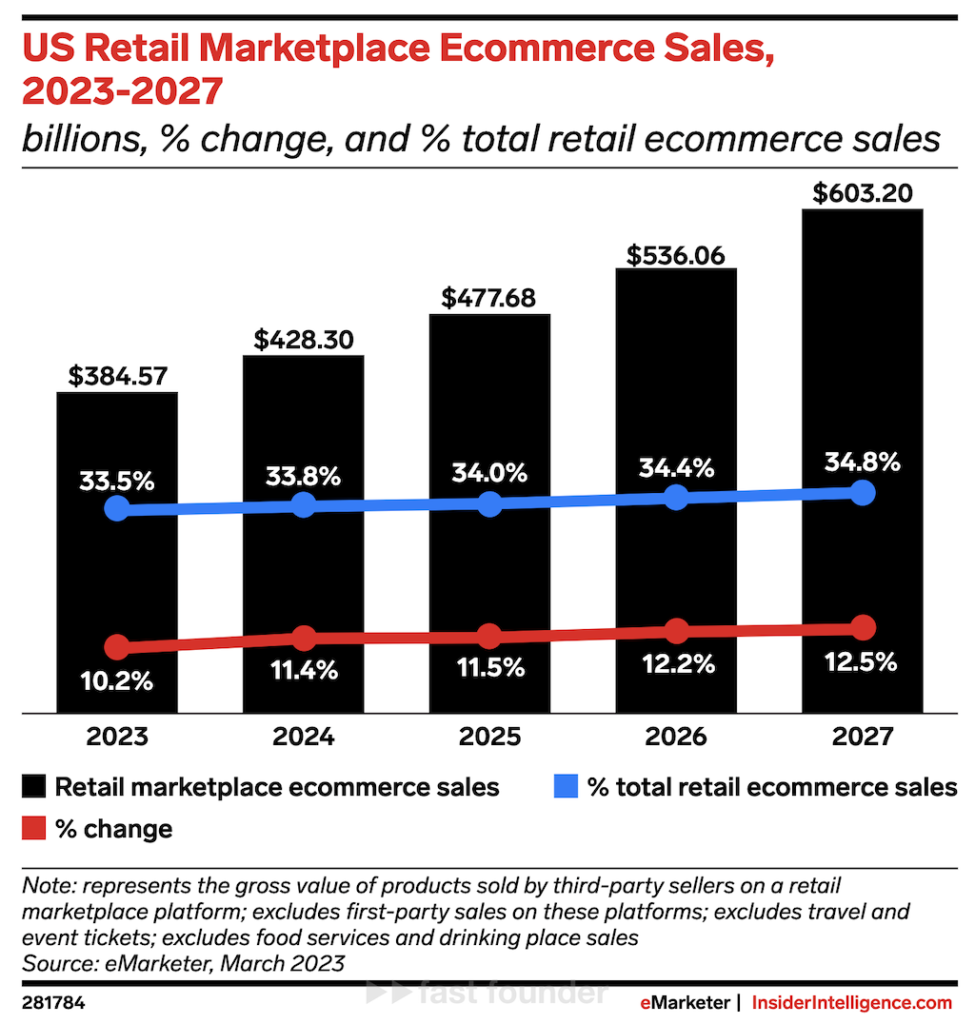1.An unexpected fact — but 25% of B2B SaaS sales already go through cloud marketplaces such as AWS, Microsoft Azure, and Google Cloud. Everyone is already talking about how marketplaces will become the most powerful channel for B2B sales of cloud services!
2. This means that, just like in the “regular” e-commerce market, platforms helping cloud service developers sell their products through cloud marketplaces will start to soar. One such platform has already raised $150 million in investments, and its revenue last year grew by almost 7,000 percent!
3. And this startup “borrowed” their platform from them just last year, but also took off sharply and raised $14 million in investments. So, there’s still time to enter this large and growing market with your own platform, created using the same recipe:
Project Essence

Clazar has developed a platform that assists cloud B2B service developers in selling subscriptions to their services through cloud marketplaces such as AWS, Microsoft Azure, and Google Cloud Platform.

With Clazar, developers can list their service on all necessary marketplaces within a few weeks with minimal effort from the programming team. Without using the platform, this could take months of significantly greater effort.

B2B sales to larger clients always involve negotiations on prices, even when selling cloud services. Clazar enables developers to send personalized offers to potential customers who have just shown interest in the service on the cloud marketplace, as well as to existing customers whose subscription renewal is due.
All these offers can be sent directly from CRM systems like HubSpot and Salesforce if integrated with Clazar, and further correspondence can be conducted there. Thus, sales control through cloud marketplaces fits seamlessly into a unified sales business process.

Similarly, Clazar can be integrated with proprietary systems that track customer resource usage and send them invoices for payment. As a result, the Clazar platform and the integrated CRM provide full information about customers, how they use subscriptions through cloud marketplaces, and how much they pay for it.

Using all this data, Clazar can generate various reports showing the progress of service sales through cloud marketplaces.

B2B services are often sold through intermediaries such as system integrators, implementers, consultants, and other types of partners. Clazar supports partner sales through cloud marketplaces by automatically pulling referral links from cloud marketplaces into CRM systems and vice versa.

Standard pricing for using the standard feature set of the Clazar platform ranges from $499 to $2,999 per month. If there are many services to sell and there are additional platform requirements, special terms can be discussed directly with the startup.

Clazar was founded just last year, and right from the start, it attracted $4 million in investments.
In less than a year of operation, it has connected over 100 clients to its platform. Therefore, it has now raised another $10 million in investments.
What’s Interesting

In conventional e-commerce, marketplaces account for 30–45% of all online retail sales. In the United States, for example, this constitutes 33.5% of $384 billion, which is projected to grow to 34.8% of $603 billion by 2027.

Remarkably, a similar situation arises in B2B sales of cloud services. As early as 2020, 25% of B2B SaaS sales were conducted through cloud marketplaces. Forecasts even suggest that this share could grow to 75% in the coming years.

This trend is driven by the convenience for companies to purchase all cloud services through a “single window.” This ensures that all cloud services purchased in this manner will be easily and quickly integrated with each other. Additionally, it significantly simplifies payment processes and expense tracking for everything stored in the cloud.

Developers on such marketplaces gain access to a wide range of potential clients and immediately fit into the budgets set by companies for the cloud. This reduces deal closure time by 62% and streamlines contract signing and subsequent customer billing processes by 64%.

Through AWS, Microsoft Azure, and Google Cloud Platform alone, $340 billion already flows, paid by companies to them and the cloud services hosted on these marketplaces.
Moreover, the average contract sizes concluded with developers through marketplaces are 80% higher than contracts concluded through other channels. Thus, revenue through cloud marketplaces for cloud service developers can account for 20% of their total revenue if they effectively utilize this channel—such as through Clazar.

It is anticipated that in 2025, SaaS developers will receive $45 billion through cloud marketplaces, representing an 84% growth compared to the previous period. Although growth was projected at half this rate a year ago.

Such a lucrative market segment could not escape the attention of other startups. Clazar, apparently, borrowed its platform from Tackle, a startup that has already raised $148.3 million in investments. And not without reason 😉

In 2023, Tackle ranked 27th on Deloitte’s list of the 500 fastest-growing technology companies because its revenue grew by 6,586%—yes, six thousand five hundred eighty-six percent!
Where to Go
The first conclusion is obvious. If you’re developing B2B SaaS, your path leads to cloud marketplaces.
The second conclusion is that you can still create your own service to streamline sales through cloud marketplaces following the example of Clazar and Tackle. Tackle was created back in 2016, while Clazar—only last year, but it managed to quickly find its first hundred customers. Moreover, in some regions, there are their own cloud marketplaces—with which integration can also be established to acquire customers from these regions.
The third direction, while less obvious, is still possible. You can even create your own cloud marketplaces.
At the very least, it could be a marketplace offering hosting services for open-source LLM and selling related AI services from third-party developers. There are quite a few such platforms emerging now, and all of them are finding their customers because the demand for AI is growing very rapidly and powerfully.

Furthermore, you can implement more sophisticated models. A Canadian startup called Vendasta has created an interesting marketplace for selling online services from third-party developers, about which I wrote last fall.
It has created a marketplace where digital agencies providing services to small businesses (website creation, advertising and marketing, search engine optimization, etc.) can create their own marketplaces to resell other people’s online services to their clients. This service has proved to be so in demand that Vendasta has raised $248.6 million Canadian dollars in investments, which is approximately equivalent to $185 million USD.

By the way, riding the wave of AI popularity, this startup has now begun to separately promote the direction of reselling AI services using the same model.
In e-commerce, there was first a powerful wave of creating proprietary marketplaces—from universal to niche ones—where most sellers wanted to be present. And then came another wave—already of creating tools for efficient work of sellers through these marketplaces.
As we can see, a similar story is happening now in the B2B SaaS market. And this means that in one of the similar waves, but in this market, you can still catch the wave. It remains only to decide—with what exactly 😉
What about you? What do you want to jump into here?
About the Company
Clazar
Website: clazar.io
Latest round: $10M, 18.04.2024
Total investments: $14M, rounds: 2
